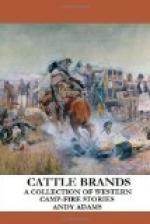Then there were the freight trains, the motive power of which was mules and oxen. It was necessary to carry forward supplies and bring back the crude products of the country. The Chihuahua wagon was drawn sometimes by twelve, sometimes by twenty mules, four abreast in the swing, the leaders and wheelers being single teams. For mutual protection trains were made up of from ten to twenty wagons. Drivers frequently meeting a chance acquaintance going in an opposite direction would ask, “What is your cargo?” and the answer would be frankly given, “Specie.” Many a Chihuahua wagon carried three or four tons of gold and silver, generally the latter. Here was a new book for this college lad, one he had never studied, though it was more interesting to him than some he had read. There was something thrilling in all this new life. He liked it. The romance was real; it was not an imitation. People answered his few questions and asked none in return.
In this frontier village at a late hour one night young Wells overheard this conversation: “Hello, Bill,” said the case-keeper in a faro game, as he turned his head halfway round to see who was the owner of the monster hand which had just reached over his shoulder and placed a stack of silver dollars on a card, marking it to win, “I’ve missed you the last few days. Where have you been so long?”
“Oh, I’ve just been out to El Paso on a little pasear guarding the stage,” was the reply. Now the little pasear was a continuous night and day round-trip of twelve hundred miles. Bill had slept and eaten as he could. When mounted, he scouted every possible point of ambush for lurking Indian or bandit. Crossing open stretches of country, he climbed up on the stage and slept. Now having returned, he was anxious to get his wages into circulation. Here were characters worthy of a passing glance.
Interesting as this frontier life was to the young man, he prepared for his final destination. He had no trouble in locating his father’s property, for it was less than twenty miles from San Antonio. Securing an American who spoke Spanish, the two set out on horseback. There were several small ranchitos on the tract, where five or six Mexican families lived. Each family had a field and raised corn for bread. A flock of goats furnished them milk and meat. The same class of people in older States were called squatters, making no claim to ownership of the land. They needed little clothing, the climate being in their favor.
The men worked at times. The pecan crop which grew along the creek bottoms was beginning to have a value in the coast towns for shipment to northern markets, and this furnished them revenue for their simple needs. All kinds of game was in abundance, including waterfowl in winter, though winter here was only such in name. These simple people gave a welcome to the New Yorker which appeared sincere. They offered no apology for their presence on this land, nor was such in order, for it was the custom of the country. They merely referred to themselves as “his people,” as though belonging to the land.




